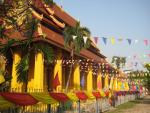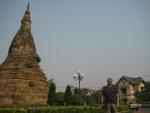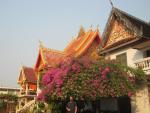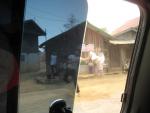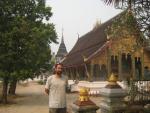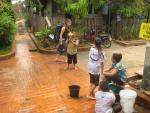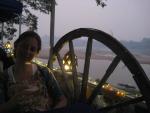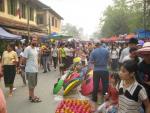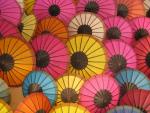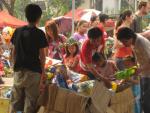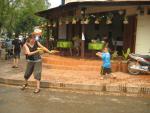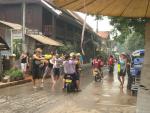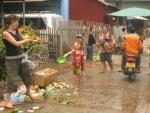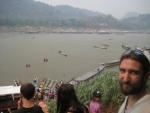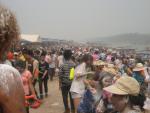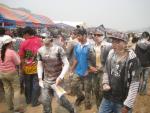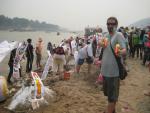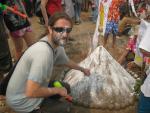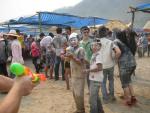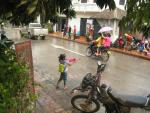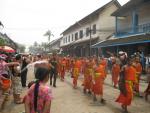Sabidee Pimai - celebrating the Lao New Year
Fri 16th Apr 2010 — drew
Vietnam is very narrow around Hue, so it was only a 4 hour bus ride west into the hills to reach the Laos border. We had set off early in the morning, so reached the border around the midday sun (when we often seem to find ourselves outside!) Despite reading several horror stories of tourists being left stranded in the middle of nowhere on these border crossings by bus, we had a very hassle-free experience and soon found ourselves back on our bus in Laos admiring more stickers and stamps in our passports.
It was another 5 or 6 hours before we arrived in Savannakhet on the banks of the river Mekong in Southern Laos. For the last hour or so of the journey, there had been occasional bursts of light rain, but just as we arrived this turned into a torrential downpour and we were a bit perturbed as the bus doors opened and we were told to get off. The bus stop was in the courtyard of one of the few tourist hotels in Savannakhet, and the hotel did very well out of the storm - pretty much all of the disembarking foreigners opted to get a room here rather than getting a soaking checking out the competition.
Savannakhet is described as having a faded charm with crumbling French villas, and bougainvillea-lined boulevards. Once the deluge subsided we went for a wander around the deserted streets, and found ourselves on the banks of the Mekong looking at Thailand on the other side. We were close enough to use up some left-over credit on our Thai mobile phones.
It was a very brief overnight stop in Savannakhet and we were on a bus again the next morning heading north to the capital, Vientiane. We were not sure what to expect from Lao public buses and were initially very pleased to find ourselves on a cool, comfortable bus with reasonably big seats - just as well, as the journey was to take 11 hours. This is the height of the dry season, and most of the countryside we passed through seemed very arid and barren, with a dusty orange colour predominating.
As the bus progressed, more and more people were packed in - there was a stack of small plastic stools and these were used to provide more seating in the aisle. For the last few hours there was a bit of a cattle truck feel to it. The claustrophobic atmosphere was not helped by the deafeningly loud music blasting out. We're not sure what caused it, but Drew developed a very upset stomach at some stage, and spent the last couple of hours concentrating on not erupting from one end or the other, so we were very relieved to arrive in Vientiane around 9pm. It had been dark for hours by then, but it was very warm and humid air that greeted us as we escaped from the sardine-can of a bus.
Vietiane is also situated on the banks of the Mekong river with Thailand on the other side and is a very beautiful, relaxed capital city. It's renowned for its good food, with both Lao cuisine and all sorts of international fare widely available, so Drew was happy that he recovered from his upset stomach within a couple of days and was able to enjoy these treats. On our first day wandering around, we were very pleasantly surprised to bump into a few of the people we had worked with at the Burmese charity in Bang Niang. The Burmese IT person that Drew had worked with and his wife were just leaving, but the volunteer co-ordinator was in town for a few days waiting for a visa - which was a very lucky co-incidence - it was fun to spend a few more days together.
It was hard to convince ourselves that we wanted to get on another bus and move on after a few very relaxing days in Vientiane. We had planned on getting a VIP (tourist) bus up to Luang Prabang, which is another 10 hours or so up into the mountains to the north. However, this turned out not to be an option as every seat on the many buses doing the route was booked. This is a notoriously difficult time of year to be travelling in Laos, as the whole country stops to celebrate Lao New Year for several days. We were told our best bet was to turn up at the public bus station early in the morning and hope for the best. This prospect didn't fill us with joy. We were very relieved eventually to spot an advert for a shared minibus driving to Luang Prabang on the day we wanted to go, and the cost per person was only a couple of dollars more than the VIP bus would have been. We didn't regret this slight indulgence as we passed the big public buses struggling up the hills, and many broken down at the side of the road with smoking engines on a very hot day.
Until fairly recently, boats along the Mekong were the main mode of transport through Laos as the main roads were very poor. You can still catch a slow boat from Vientiane up to Luang Prabang, and if we had bags of time perhaps we'd have considered this. The road is now pretty good, but necessarily steep and winding into the mountains. It's very hazy at the moment, but we still appreciated the dramatic scenery as we slowly climbed into the limestone hills, and the temperature eased a little.
The Lonely Planet characterises the contrast in the laid-backness of Laotians in comparison to their neighbours by saying something along the lines of "if Vietnam and Laos were taxi drivers, Vietnam would be following you down the street touting for your business, but if you wanted Laos to drive you somewhere you'd have to wake him up first". We experienced this a couple of times - two shop owners in Vientiane with signs offering a laundry service sleepily waved us towards each other's shops when we wanted to get our washing done. Arranging the minibus took a fair bit of persuasion on our part - it seemed like someone else had put the sign up outside the travel agency, and they didn't seem too bothered about organising it. We had read, however, that this endearing laid-backness is discarded for a few days of energetic partying during New Year celebrations, and that Luang Prabang is a great place to join in the festivities. We've not been disappointed.
One of the most characteristic aspects of the New Year, or Pimai, celebrations is the dousing of each other with water and flour which is meant as a wish for long and healthy life. Over the years this has developed into full blown water fights across the country for three days. Our first experience of this was in the minibus, when we were suddenly woken from a snooze by a spray of water coming in through the windows. At many points along the road, groups of mainly children had gathered to enthusiastically hurl buckets of water at passing vehicles. As this is a benevolent gesture which is supposed to benefit both the giver and the receiver, our driver had the windows open as we passed through towns and villages, and we were impressed by the accurate aim of the throwers, who got a lot of water on target!
Celebrating the new year in Luang Prabang has certainly been one of the most fun experiences of our travels. We were lucky to be invited along with our guest house owners to join in with one of the traditions; we took a boat to the other side of the river where a big party was under way on a large sandbank next to a small village. As people disembarked from their boats, they'd build large sandcastles which are decorated with flour and represent Buddhist stupas. Having been soaked during water fights on the way to the sandbank, we were then smeared with flour on our arrival.
The traditional method of wetting people as part of the celebrations seems to be to pour a cup of water down the back of the neck. This has been partly replaced by an arms race of ever-larger and more elaborate water pistols (the word pistol doesn't do justice to the huge contraptions many people have). Several open-backed trucks laden with barrels of water and water-pistol toting sharp-shooters drive around the city spraying people on the streets at every opportunity, and other groups have parties by the side of the road soaking passers by. The chaos as one of the trucks passes one of the soaking stations is quite something to behold, and on a few of the main streets there's a station every few meters and a constant procession of trucks.
Both days of the celebrations so far we've been drenched from head to toe for most of the day, and thoroughly enjoyed it. It's hard to do the chaos justice with photos - after some cautious attempts to take pictures whilst keeping the camera dry, we ended up leaving the camera behind. Joining in at one of the soaking stations for a while, we were welcomed into the party. There was a procession down the street led by monks carrying a Buddhist statue to one of the many temples. Some of the young monks looked less than impressed as they were liberally soaked; it's maybe not so much fun when you are not allowed to retaliate. The following procession included 'Miss Luang Prabang' contestants (whose float was surrounded by police guards trying to protect them from the worst of the water and getting thoroughly soaked in the process), dancing boys with monkey masks, and pretty young girls twirling parasols. Bringing up the rear of the procession was a long tail of revellers up for a water battle.
Stretching over three days or more, Pimai must be one of the most enthusiastically embraced and longest sustained water fights around. It's hard not to laugh out loud at look of glee on children's faces as they see somebody approaching carrying a water pistol, and therefore obviously up for a fight. Yesterday we were exposed to an evolution of the traditional water-down-the-neck gesture as people scooped up meltwater from buckets of iced drinks, and laughed like crazy at the shivers this induced. Another recent evolution has been to smear engine grease on people's faces but we have been pleased to avoid this. It has been great fun, but as the city returns to normality tomorrow we will not be too upset to be able to venture outside without having to prepare ourselves to get soaked and to experience the gentle, relaxing atmosphere that Luang Prabang is renowned for. It remains to be seen whether Drew will be able to part with his mightiness squirt-gun!
- ‹ previous
- 62 of 70
- next ›

